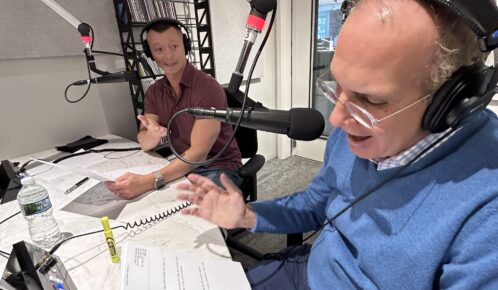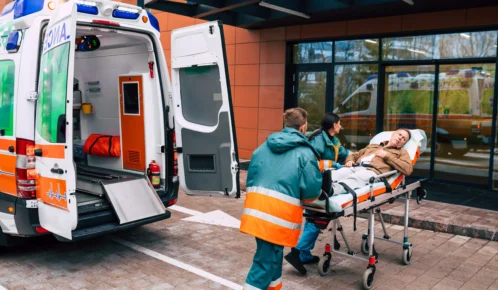After a crash, you may wonder, “what can I sue for in a car accident lawsuit?” You can sue for medical costs, wage or income loss, property loss, physical pain and suffering, and other damages in a car accident lawsuit. The amount you can recover depends on the severity of your injuries, the facts of your case, and your share of fault.
Table of Contents

At Ankin Law, our lawyers combine all aspects of Illinois personal injury law, identifying all liable parties, to make sure your car accident recovery is maximized. Call 312-600-0000 now to schedule your free consultation.
Who Can You Sue for Car Accident Injuries?
Determining who to sue after a car accident is critical to maximizing your compensation. When you hire our car accident attorneys, we will review your case details, gather evidence, and determine the liable party or parties under state negligence laws. You might be able to file a lawsuit against a negligent driver, a vehicle manufacturer, a mechanic, or even a government agency. If you were working when the accident happened, you might also have a workers’ compensation claim. We may involve private investigators or accident reconstruction experts to help us identify all parties who contributed to your crash and accurately calculate your damages. Determining all sources of recovery and estimating your damages can help us decide whether it’s worth it for you to sue.
Types of Damages You Can Recover in Car Accident Claims
In Illinois, you have the right to recover compensation after an accident if you incur losses you wouldn’t have otherwise incurred if the crash had not happened. The types of damages you can pursue in a car accident lawsuit include:
Medical Bills
Medical expenses usually account for a significant amount of quantifiable losses or damages in car accident claims. Medical costs comprise all the expenses you have faced because of the accident and estimated costs of medical treatment you might require in the future. Compensation for medical bills can cover expenses such as:
- Ambulance rides and emergency room (ER) treatment
- Hospitalization costs
- Surgeries
- Doctor’s visits
- Medication and medical devices
- Physical therapy, rehabilitation costs, and expenses for at-home care
The more severe the injuries you sustain in a car accident, the higher the medical expenses. Your lawyer will work with medical experts to estimate the future medical bills you might incur.
Wage or Income Losses
You may pursue damages for your lost wages or income if your accident-related injuries force you to take a temporary or permanent break from work. It’s easy to calculate lost wages or income. You just need to multiply your daily wage or earnings by the days you have been away from work.
Determining future wage or income losses, or decreases in earning capacity, may be tough. Multiple factors, including your pre-accident earnings, health, the likelihood of advancement, and how long you would have worked can affect your estimated future wage or income losses. Records of past earnings and expert testimony are instrumental in proving your estimated future income losses.
Property Losses
Under Illinois law, drivers must have property damage liability to cover damage to property they cause in a car accident. If you incurred vehicle repair costs, you could pursue those expenses from the liable driver.
You can seek compensation for the transportation expenses incurred when your car was in the auto repair shop. You can also recover compensation to cover the replacement cost if your car got totaled in the accident.
Other property losses you might pursue from the at-fault party include towing charges and vehicle storage costs, replacement costs for damaged personal property, and a decline in your vehicle value after repair.
Physical Pain and Suffering
This covers the pain you experience after a crash or resulting injuries. It also covers mental trauma, which can arise from the injuries suffered or the car crash itself. Anxiety, depression, and social disorders are some examples of mental trauma. The value of your pain and suffering will depend on your injury severity, the long-term impact of the injury on your life, and expert testimony.
Loss of Quality of Life
You might suffer a permanent disability or decline in the quality of life after getting injured in a car accident. You have the right to seek compensation for the loss of the quality of life. An attorney can help you claim emotional injury for a car accident.
Scars or Disfigurements
A car accident can leave you with permanent scars and disfigurements. You might recover compensation for your permanent scars and disfigurement in a car accident claim.
Who Pays for Car Accident Compensation in Illinois?
Illinois is an at-fault state that operates under a modified comparative negligence rule. The at-fault party must pay damages, but your compensation reduces based on your percentage of fault. You can only recover damages if you are less than 50% at fault.
Your options for pursuing compensation for an Illinois car accident include:
How to Pursue Compensation After a Motor Vehicle Accident
- Third-Party Claim Against the At-Fault Driver’s Insurance
File a claim with the liable driver’s insurer. Expect an adjuster to investigate and offer a settlement, often low at first. Let your lawyer handle negotiations to maximize your payout. - File a Lawsuit Against the At-Fault Driver Directly
If the driver lacks insurance or has insufficient coverage, you can sue them personally. This can be difficult if the driver has limited assets. - First-Party Claim with Your Insurance
Your own insurance policy may cover medical bills (Medical Payments Coverage), vehicle damage (Collision Coverage), or uninsured/underinsured motorist losses (UM/UIM). Note that insurers may seek reimbursement (subrogation), but your attorney can negotiate to reduce or waive this.
How Is Liability Determined in a Car Accident?
Determining liability for a car accident is a time-consuming process. It requires an understanding of state-specific motor vehicle accident laws and in-depth investigation. Reconstructing the accident is sometimes necessary to identify all the potentially at-fault parties. The following are some factors your attorney will consider when determining liability for a car accident:
Accident Details
Specific details of the accident, including how it happened, weather and road conditions, and damage to your vehicle, may help identify the at-fault party. Other important accident details include contact information of eyewitnesses and the other driver, and the other vehicle’s plate number. Those details are as important as the information in a police report. So, ensure you record them immediately after the accident.
Witness Statements
Statements from credible eyewitnesses are one of the most reliable forms of evidence for determining liability in a car accident. A credible eyewitness statement can validate your account of the accident and help you prove you are not at fault in a car accident.
Police Report
Police officers usually arrive at the accident scene and compile a police report. Ensure you report the accident at the nearest local police station if police officers do not respond to the accident. A police report is another crucial form of evidence for proving the other party’s liability. The report includes specific accident details and observations of the responding officer.
The report covers several things, such as the involved parties, possible cause of the crash and why, accounts of the involved parties, and witness accounts.
Photo Evidence
Pictures of the accident scene can show how an accident happened, factors that might have contributed to the accident, and the nature of damages and injuries you suffered. A photo of the traffic sign present at the time of the crash may help reconstruct the entire accident scene.
Skid marks may show the exact vehicle’s position at the time of the accident. Pictures of the damage sustained by your car can reveal where it was struck. An accident lawyer can review the photo evidence to determine who caused the accident.
Hiring a Car Accident Lawyer to Sue for Injuries
Hiring an experienced attorney is critical to the success of your claim – especially if you have to go to court. If you choose to hire a lawyer for your case, you should do so as soon as possible. In Illinois, you only have a short amount of time to take legal action. How much a car accident lawyer costs is a common concern among accident victims, but Illinois car accident lawyers usually take cases on a contingency fee agreement. This attorney-client fee agreement means the lawyer earns legal fees only if you receive a settlement or court-awarded damages. You do not pay anything if you lose the case.
To find out more about what you can sue for in a car accident lawsuit, and how Ankin Law can help you recover, call 312-600-0000 now.



